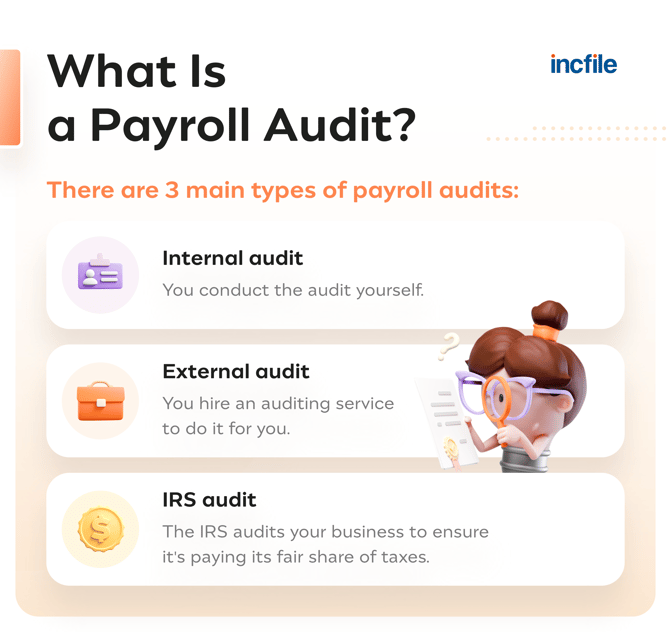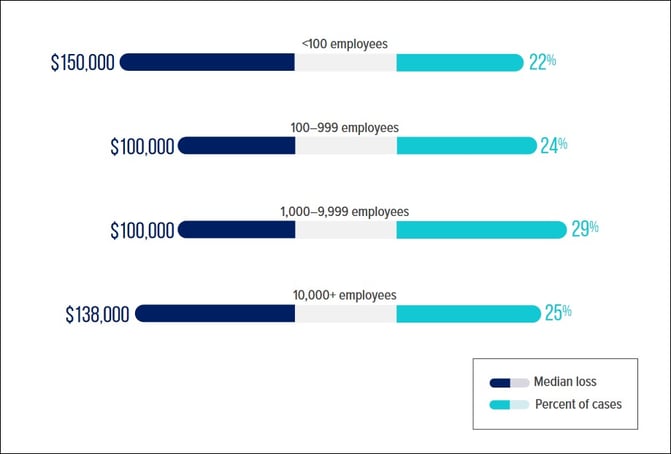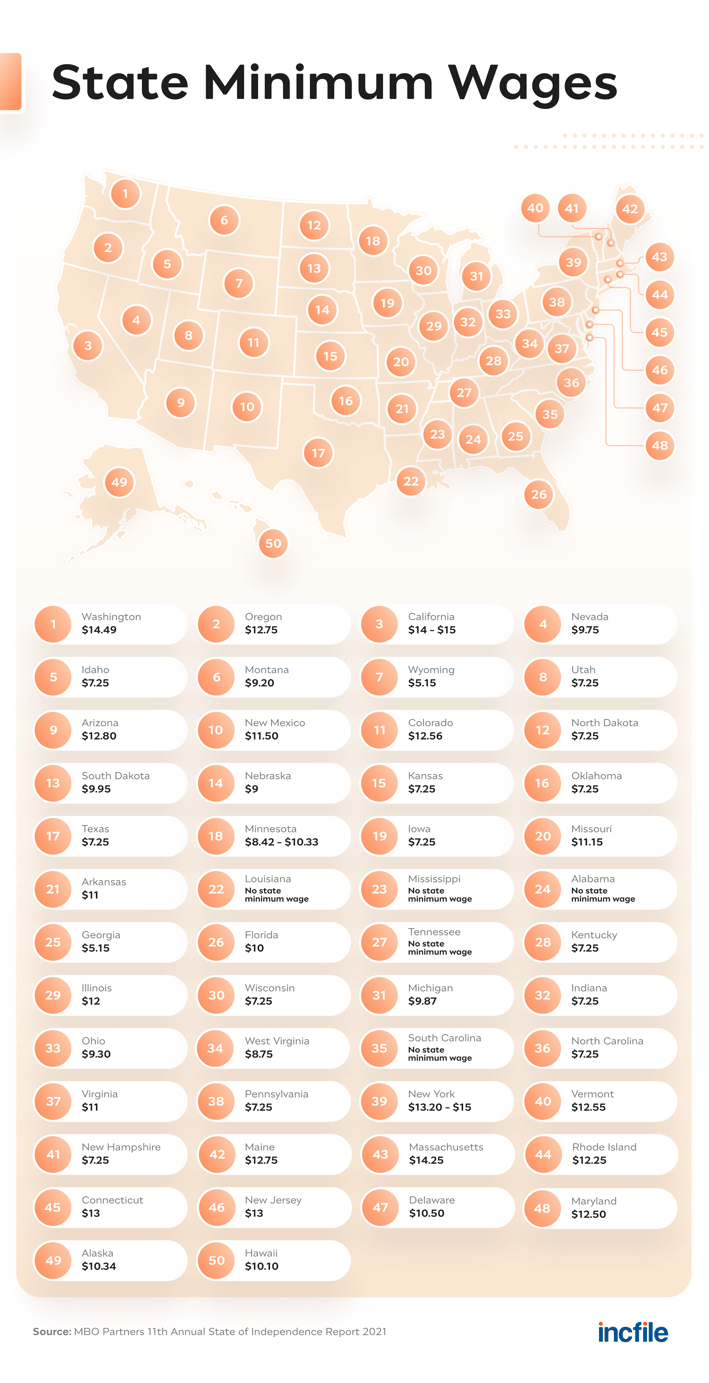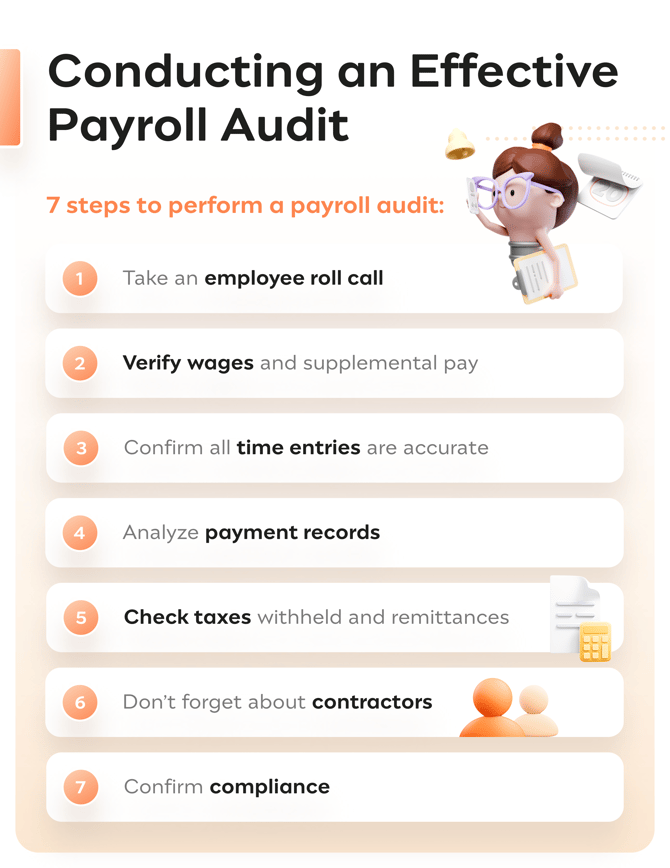Every business owner wants to cut costs and increase profits, but that doesn't always mean adopting new practices or trying out cutting-edge software. In fact, one of the best ways you can save money and ensure compliance is by conducting a payroll audit.
Want to know what a payroll audit is, what it should include and how you can perform one yourself? Ahead, we'll explain everything from A to Z.

What Is a Payroll Audit?
There are three major types of audits: internal, external, and IRS.

A payroll audit typically falls under the category of an internal audit, unless you contract a third-party company. But what is a payroll audit, exactly?
In a few words, a payroll audit is an in-depth analysis of your business's payroll systems and records.
The benefits of payroll audits are numerous (and great for your wallet). If you perform one, you'll be able to:
- Identify and correct costly payroll errors.
- Maintain a higher level of accuracy.
- Ensure regulatory compliance.
- Better organize your records.
- Streamline your taxes.
- Eliminate payroll fraud.
- Stop miscalculations before they start.
Who Should Do a Payroll Audit?
The answer to this question is simple: Every business with a payroll should conduct a payroll audit.
In fact, payroll audits are especially crucial for small businesses. That's because payroll fraud occurs just as often in small companies as it does in large ones, yet small companies are less likely to have the resources and tools they need to recover fully.
And after falling victim to fraud, small businesses (those with 100 or fewer employees) have the highest median loss of $150,000. By comparison, large companies (those with 10,000 or more employees) have a relatively small median loss of just $138,000:

Source
Payroll audits are also important for small businesses because they make it easier to identify errors with salaries, taxes, hours worked, and more, all of which can balloon into very expensive problems if left unaddressed.
The bottom line is that if you own a Limited Liability Company (LLC) or corporation that has employees on its payroll, then you need to conduct a payroll audit.
How Often Should a Payroll Audit Occur?
There is no hard-and-fast rule about how frequently you should perform a payroll audit, but you will need to do so on a regular basis.
To be safe, aim to conduct a payroll audit at least annually or more often if your business has a high employee turnover rate.
By performing an audit at least once per year, you'll ensure that no payroll changes will have the chance to cause unforeseen consequences. Those changes could include:
- Employees being hired
- Employees leaving
- Wage increases and decreases
- Bonuses
- New payroll processes
- New payroll software
- New protocols for clocking in or out
- Different tax rates or forms
While all of those changes are routine, they present a perfect opportunity for payroll errors to be made, whether unintentionally or otherwise.
So, regularly performing a payroll audit will help prevent any errors from slipping through the cracks.
What Should a Payroll Audit Include?
A complete payroll audit should include multiple elements, all of which you'll need to examine in-depth (more on that in the next section).
Those elements typically include each employee's:
- Employment status, i.e., part-time, full-time, or seasonal/temporary
- Salary or wage, depending on whether they're paid a set annual amount or by the hour
- Hours worked, if applicable
- Income received, i.e., the amount of money you've actually given to each employee thus far
- Supplemental pay, including bonuses, overtime, and commissions
- Paid time off (PTO), including planned vacations, sick days, and personal days
- Tax forms, such as the W-4 form for employees or the W-9 form for independent contractors
- Withheld taxes, such as Social Security and Medicare
You'll also need to examine your business's:
- List of current employees, as well as a list of former employees
- Pay rates, including pay frequency
- Supplemental pay and PTO policies, plus the records of all supplemental pay and PTO you've paid
- Bank statements for every month that's elapsed since your last payroll audit
- Bookkeeping records, such as your general ledger
- Tax forms and returns, as well as any communications from the IRS
Don't forget to brush up on your state's current wage laws, too. While the federal minimum wage for employees subject to the Fair Labor Standards Act (FLSA) is $7.25 per hour as of 2022, many states have one that's much higher.
Need a quick refresher? Find out what your employees' minimum wage should be. Click the image to see a larger version.

For more information on the labor laws in your state, check the Department of Labor's library of resources.
How Do You Conduct an Effective Payroll Audit?
You can perform an effective manual payroll audit using a few important steps:
1. Take an Employee Roll Call
Look at your list of current employees and ensure that everyone on it actually works for you. This will prevent payments from being inadvertently sent to former or nonexistent employees.
If you do find anyone on your list that shouldn't be there, remove them immediately and check to ensure they haven't already received more payments than necessary.
2. Verify Wages and Supplemental Pay
Once you've confirmed everyone on your payroll is, in fact, an employee, verify that they're receiving the correct salary/wage rate and supplemental pay.
If you find any discrepancies, be sure to check how long they've been going on so you can make any retroactive corrections as needed.

3. Confirm All Time Entries Are Accurate
If you pay your employees by the hour, take the time to look at all their time entries and verify that their hours worked are accurately recorded and correctly labeled.
For instance, you might discover that regular hours have been incorrectly categorized as overtime or that one employee accidentally stayed clocked in overnight.
4. Analyze Payment Records
Pull up your payroll software (or your company checkbook, depending on your preferred payment method) and take a look at how much you've paid each employee.
Compare those amounts to your bank statements and general ledger to ensure that all your payments are going to their intended recipients.
5. Check Taxes Withheld and Remittances
It isn't always easy to determine how much of each employee's salary you should be withholding for taxes and passing along to the government, so it's important to go back and check that your calculations are correct.
Remember to ensure that you not only withheld the correct amount of money from each paycheck but also that you indeed sent it to the IRS or state government.
6. Don't Forget About Contractors
If you hire independent contractors in addition to regular employees, it's important to include them in your payroll audit too.
Examine their contract status, pay rate, time entries, and payment records to make sure that everything's squared away. While you're at it, check to see that each contract is up-to-date, too (if you find yourself needing new ones, our library of business contract templates can help).
7. Confirm Compliance
Familiarize yourself with your state's minimum wage and overtime laws, and keep the federal minimum wage in mind too. Then, go over your employees' pay rates once more to make sure they all meet or exceed) the minimum amount.
Also review the IRS's recordkeeping guidelines to avoid throwing away old records that you should be keeping around.
